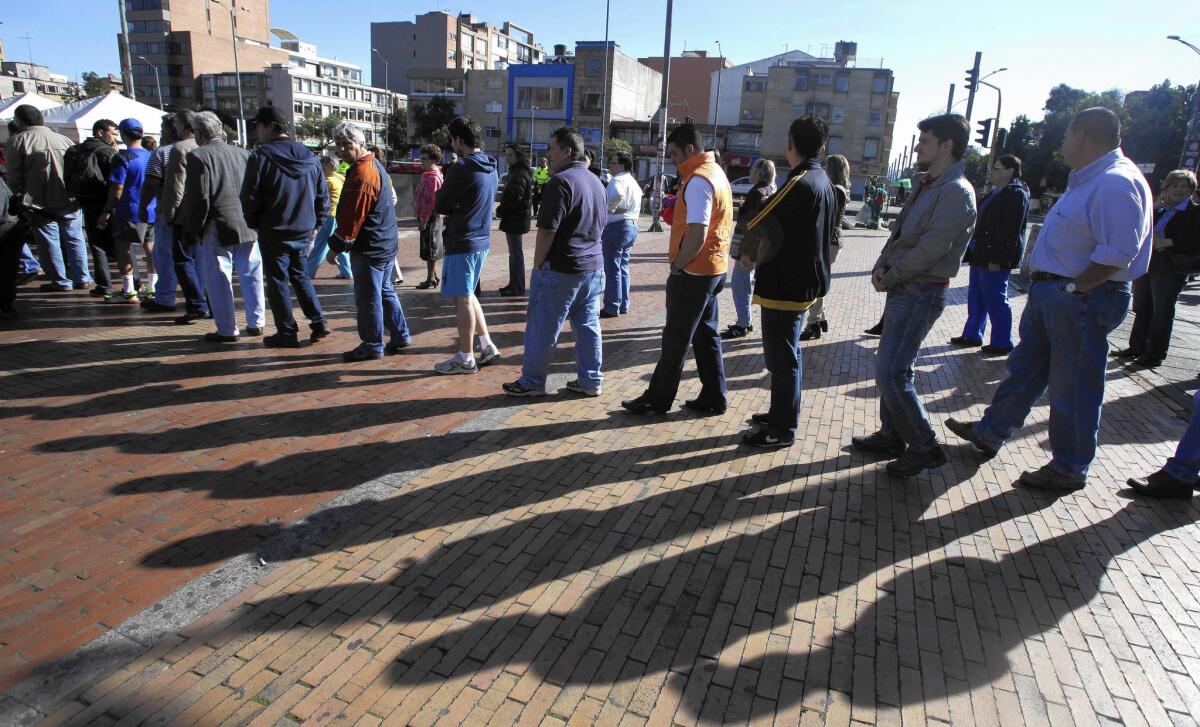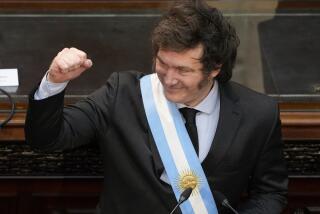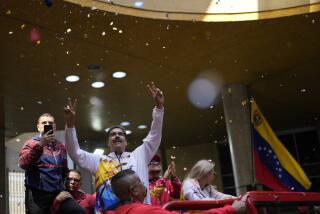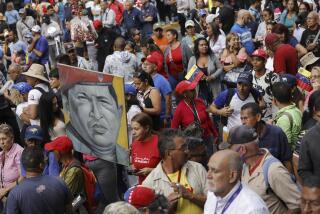Colombia president, rival head to runoff vote

In a presidential election marked by campaign mudslinging and low voter turnout, right-wing candidate Oscar Ivan Zuluaga, a harsh critic of Colombian President Juan Manuel Santos’ peace initiative with leftist rebels, tallied the most votes in Sunday’s first round but fell far short of the simple majority needed for outright victory.
With 99% of votes counted in a five-way race, Zuluaga, a businessman and former finance minister, had 29.3% of the votes cast, compared with Santos’ 25.6%. Zuluaga and Santos will face each other in a June 15 runoff.
Although he emerges from the first round with a plurality of votes, Zuluaga faces an enormous challenge in the runoff. He and Santos will now vie for endorsements from the three losing candidates: two former Bogota mayors, Clara Lopez and Enrique Penalosa, and former Defense Minister Marta Lucia Ramirez.
Analysts have said the centrist Santos is in a better position than Zuluaga to secure pledges of support from losing candidates and fashion a winning alliance. Still, the vote amounted to a repudiation by many Colombians of the incumbent’s performance.
Pollster Jorge Londono told TV viewers Sunday afternoon that turnout was running as low as 40% in much of the country, a historically low level. Some analysts had warned that voters were turned off by the dirty campaign tactics employed by the Zuluaga and Santos camps and would stay away in droves.
A big issue for voters is the Havana peace talks with leftist rebels touted by Santos as the key to ending 50 years of civil conflict and ensuring Colombia’s future prosperity. But the talks with the Revolutionary Armed Forces of Colombia, or FARC, have dragged on longer than promised, and many Colombians oppose giving rebel leaders impunity for past crimes and seats in Congress, which probably would be conditions of any peace deal.
Leading the criticism of Santos’ efforts to seek a negotiated peace deal was former President Alvaro Uribe, Zuluaga’s patron and an implacable Santos foe. Uribe contends that only a military victory will subdue the FARC once and for all.
After initially saying he would stop the peace talks if elected, Zuluaga now says he would merely declare a pause in negotiations to assess them. This month, government and rebel negotiators announced they had agreed on ways to end the FARC’s involvement in drug trafficking, the third of five main peace negotiating points.
The voting also was a referendum on the performance of Santos, who despite a thriving economy and solid backing of most of Colombia’s media (his family formerly owned El Tiempo, the nation’s most influential newspaper) has failed to connect with the majority of Colombians, said political science professor Arlene Tickner of University of the Andes in Bogota.
“Santos is identified as a Bogota oligarch, and outside the capital that doesn’t sit well with a lot of the electorate,” Tickner said. “He hasn’t done an especially good job of communicating his achievements.”
University of Miami international relations professor Bruce Bagley said Santos has been hurt in voters’ eyes by the bankruptcy of Colombia’s medical insurance and pension systems, problems that he inherited and has not resolved.
“There is also the sense among many Colombians that insecurity has risen and that many of the gains in that respect made under President Uribe have been lost,” Bagley said.
The presidential campaign was marked by scandalous disclosures that worked to disenchant voters, analysts said. A week ago, Semana magazine leaked a video purporting to show Zuluaga in the company of a person who is accused of hacking into the emails of Santos and peace negotiators.
This month, Santos faced accusations that, according to testimony of an extradited drug baron, one of his campaign officials had accepted $12 million from a group of drug traffickers to propose to the president an agreement to surrender to law enforcement and forswear illegal activities.
Santos has denied the charges, which have been voiced by his onetime boss Uribe, who said the Santos campaign kept $2 million of the money. Santos, who served as Uribe’s defense minister, recently said he would take Uribe to court over the allegations.
Colombians’ lack of enthusiasm for Santos comes despite an economy that is one of the best performing in Latin America.
Colombia’s output of goods and services could grow 4.7% this year, according to some estimates, better than the 2.7% forecast by the United Nations for Latin America and the Caribbean overall.
Kraul is a special correspondent.
More to Read
Start your day right
Sign up for Essential California for news, features and recommendations from the L.A. Times and beyond in your inbox six days a week.
You may occasionally receive promotional content from the Los Angeles Times.






